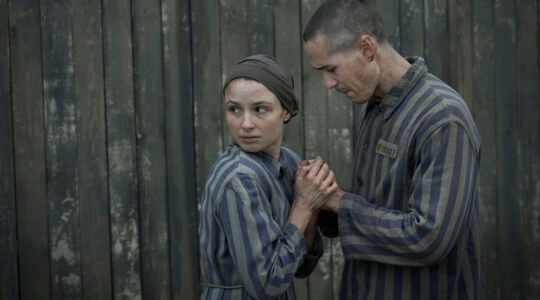NEW YORK (JTA) – In the late 1970s and early 1980s, a sure sign you had entered a bedroom of an adolescent male was the Princess Leia poster hanging over the bed. Clad in the slinky wire bikini she wore in “Return of the Jedi” or her hair braided into two dinner rolls atop her ears in “Star Wars,” actress Carrie Fisher, the female star of George Lucas’s original intergalactic trilogy, was the stuff of teenage fantasy.
For members of the tribe, Fisher, in addition to her trim figure and sizable bosom, had another desirable attribute: She was half-Jewish. It was that half that seemed to define her character. Wisecracking, skeptical and adept with a laser gun facing imperial storm troopers, Fisher had spunk and chutzpah. She wasn’t impressed by charmer Han Solo, that shaygetz.
“Princess Leia is poised, self-assured – a bit imperious even,” said Jason Rubinstein, a student at Harvard Law School, who saw “Return of the Jedi” in a movie theater at the tender age of 6. “There is something attractive about such outwardly formidable women. She fits the stereotype of an aggressive, ball-busting Jewish woman, transplanted to a galaxy far, far away.”
Two decades later, with the release of the Star Wars prequel, Jewish adolescents and teens-at-heart found a new Semitic fantasy figure. Natalie Portman, who played Queen Amidala of the planet Naboo, was born in Jerusalem to an Israeli father and American Jewish mother. She attended Jewish day school on Long Island and still speaks Hebrew with her father. From the time she was 12 she has been balancing her acting career with her education – including undergraduate studies at Harvard College – and from all the reports, is extremely straight-laced. She engages in no drug or drinking binges, according to James L. Dickerson’s unauthorized biography, “Queen of Hearts: Natalie Portman.” She’s a vegetarian who doesn’t smoke. She once wrote a letter that appeared in the Harvard Crimson newspaper in defense of Israel.
What more could a Jewish boy want?
“I liked her a lot,” said Michael Schreiber, 26. “But when I found out she was half Israeli, I went to the moon!”
As Queen Amidala, Portman brought a less imposing “Jewish princess” than Fisher to the screen. Whereas Fisher was brash and funny (pushing the growling Chewbacca out of her way and calling him a “walking carpet”), Portman, in the first leg of the prequel, was withdrawn and soft-spoken. She wore heavy red costumes and geisha-style makeup. She spoke in a monotone that betrayed no emotion. She was a far cry from the aggressive, cosmos-politan femme fatal; she was a “nice Jewish girl” who just happened to be running the galaxy.
But Portman was in for a makeover. As the trilogy proceeded, Portman wielded a gun and pranced around the desert planet wearing white cat-suits and tight, skin-colored shirts that exposed her midriff.
Since she first appeared in “The Professional” (1994), in which she played an aspiring assassin, Natalie Portman (nee Natalie Hershlag) has built up a hardy following of fans.
“I think there are three or four different levels of fans,” Dickerson said. First he said, “there are the ‘Star Wars’ people.” Upon being cast as Queen Amidala in “The Phantom Menace,” Portman immediately became a part of the large and growing “Star Wars” iconography, including books, toys, Internet chat rooms, fan clubs and the like, which occupy the time, minds and money of many a devoted “Star Wars” fan. Second, “there’s the Jewish aspect – what you would call the ‘pin-up’ aspect,” Dickerson said, referring to the Jewish males, age 15 to 25, who are wowed that this young, Audrey Hepburn look-alike could actually be one of them. “And then there are older men and women who see in Natalie the perfect daughter.”
Michael D. Weiss, a senior at Dartmouth College and a long-time Portman fan, described himself as a combination of the younger and older fan. “With a girl like Natalie, there’s clearly such substance there,” he said. “She’s somebody you want to bring home to your parents. This would make the parents of any well-brought-up Jewish boy happy. You feel there would no longer be any need for shiksa-appeal.”
David (who – for his marriage’s sake – asked that his last name be omitted) is a Jewish New Yorker in his 20s. There’s a joke among David’s friends that he married his wife because she looks like Portman.
“We have an ongoing sick joke,” he said, “that if my wife died of some long illness, I would have some solace in the fact that I can cast Natalie Portman in the TV movie.”
David has been a die-hard Portman fan since she appeared in “Beautiful Girls” (1996), where she played a 13-year-old who captures the heart of a 20-something man (Timothy Hutton) in a small Massachusetts town. A few years later, David saw Portman star in “The Diary of Anne Frank” on Broadway. “Oddly enough,” he said, “as I was watching it I thought, ‘You know, it wouldn’t be so bad being stuck in that attic with her.'”
“Because she’s Jewish, she somehow seems more attainable,” he added. “You start thinking, ‘I can win her over with my vegetarian cholent and stories from Camp Ramah.'”
A version of this article originally appeared in 2002 in the Forward (www.forward.com) and is reprinted with permission.





